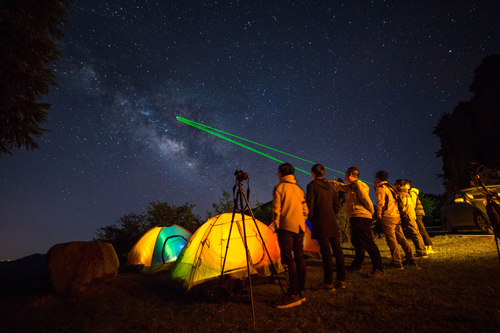

 |
Social and economic development in China has given rise to increasing urbanization and associated risks of more light pollution, says Zhou Jinfeng, secretary general of Biodiversity Conservation and Green Development Fund of China.
The U.S. journal, Science Advances, in 2016 reported that a third of the world’s population cannot see the Milky Way. The UN general assembly declared 2015 the International Year of Light to help control light pollution and protect sky observation.
The concept of light pollution was put forward in the 1930s, explained Wang Xiaohua, head of the Chinese branch of the International Dark-Sky Association.
The International Dark-Sky Association was established in the U.S. in 1988 to fight light pollution. The organization has opened 64 branches in over 20 countries and regions and approved 71 international dark-sky associations around the world, including 41 dark-sky parks.
Light pollution hinders astronomy observation and perils the living environment for animals, plants and microorganisms. Today, it has become more difficult to find a place to observe stars, said Yao Yongqiang, chief researcher at the National Astronomy Observatories of the Chinese Academy of Sciences (CAS).
Because of light pollution, the Nanjing-based Zijinshan Astronomy Observatory under CAS was converted to a museum in the 1930s, Yao added. Increasing urban light pollution and radio noise has made it difficult for people to see faint stars even with large and highly sensitive astronomy telescopes.
China’s astronomy specialists are therefore calling for national legislation to protect dark sky resources and stipulate how conduct promoting light pollution should be punished.
Over the past years, China has made much progress in protecting dark sky resources. In July 2014, the first dark-sky park came into use in Ngari Prefecture in Tibet Autonomous Region.
In June 2016, the first domestic dark sky reserve was jointly launched in Ngari by the China Biodiversity Conservation and Green Development Foundation and the regional government of Tibet. The follow-up construction and maintenance of the park and reserve is under consideration.
Proper protection of dark sky resources is driving tourism. The Ngari dark sky park has put in place 6 foldable and reflective telescopes for amateur photographers. It is estimated that over 200 sky lovers will observe stars in the park in peak tourist season.
The dark sky park will be built into a youth astronomy center and photography base to raise public awareness on the danger of light pollution. A national sky association should be launched to promote international cooperation in research and management of light pollution, Yao Yongqiang proposed.
 Fire brigade in Shanghai holds group wedding
Fire brigade in Shanghai holds group wedding Tourists enjoy ice sculptures in Datan Town, north China
Tourists enjoy ice sculptures in Datan Town, north China Sunset scenery of Dayan Pagoda in Xi'an
Sunset scenery of Dayan Pagoda in Xi'an Tourists have fun at scenic spot in Nanlong Town, NW China
Tourists have fun at scenic spot in Nanlong Town, NW China Harbin attracts tourists by making best use of ice in winter
Harbin attracts tourists by making best use of ice in winter In pics: FIS Alpine Ski Women's World Cup Slalom
In pics: FIS Alpine Ski Women's World Cup Slalom Black-necked cranes rest at reservoir in Lhunzhub County, Lhasa
Black-necked cranes rest at reservoir in Lhunzhub County, Lhasa China's FAST telescope will be available to foreign scientists in April
China's FAST telescope will be available to foreign scientists in April "She power" plays indispensable role in poverty alleviation
"She power" plays indispensable role in poverty alleviation Top 10 world news events of People's Daily in 2020
Top 10 world news events of People's Daily in 2020 Top 10 China news events of People's Daily in 2020
Top 10 China news events of People's Daily in 2020 Top 10 media buzzwords of 2020
Top 10 media buzzwords of 2020 Year-ender:10 major tourism stories of 2020
Year-ender:10 major tourism stories of 2020 No interference in Venezuelan issues
No interference in Venezuelan issues
 Biz prepares for trade spat
Biz prepares for trade spat
 Broadcasting Continent
Broadcasting Continent Australia wins Chinese CEOs as US loses
Australia wins Chinese CEOs as US loses